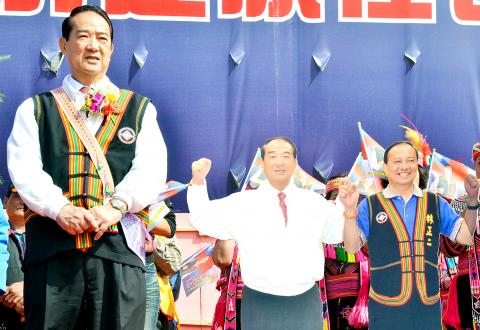The cash-strapped People First Party’s (PFP) intention of using prerecorded telephone vote canvassing in lieu of televised advertisements for its presidential campaign hit a snag when the company it contracted suddenly terminated the deal on Tuesday, a PFP official said.
The PFP reached an agreement with the company that it would pay NT$7.5 (US$0.25) per recording, with NT$2 going back to the PFP. The system was slated to be operational starting yesterday.
PFP spokesperson Wu Kun-yu (吳崑玉) revealed that the deal was called off was due to pressure from the company’s major stockholders forbidding the company from being “pro-Soong,” adding that the sales manager that signed the contract with the PFP was forced to resign.

Photo: CNA
Wu added that he suspected someone or some faction was placing restrictions on the party ever since PFP Chairman James Soong (宋楚瑜) in September announced his intention to run in the presidential election.
The latest incident showed that “not only was this someone or some faction trying to cut off the cash flow of the PFP, it was also interfering in the PFP’s small-sum fundraising efforts and cutting off the PFP’s channels of advertisement,” Wu said.
According to sources, the PFP’s fundraising operations have not been smooth, with donations by corporations ranging from NT$1 million to NT$2 million considered high.
To avoid “getting in trouble,” the corporations who donate to the PFP do not ask for a receipt, the sources added, saying that an owner of a company who was visibly rooting for Soong in Yunlin County “coincidentally” received a notice several months ago to pay back taxes dating from five years ago.
To come up with campaign funding, it is rumored that Soong recently withdrew the NT$240 million returned to him after the closing of the Chung Hsing Bills Financial case and is using the fund to pay various election expenses.
Soong was accused of embezzling funds from the Chinese Nationalist Party (KMT) when he was still a member of the party. After a failed attempt to return the money to the KMT, Soong asked the Taipei District Court to take custody of the money.
A court decision in May last year ruled that Soong could retrieve the funds.
Translated by Jake Chung, staff writer

The manufacture of the remaining 28 M1A2T Abrams tanks Taiwan purchased from the US has recently been completed, and they are expected to be delivered within the next one to two months, a source said yesterday. The Ministry of National Defense is arranging cargo ships to transport the tanks to Taiwan as soon as possible, said the source, who is familiar with the matter. The estimated arrival time ranges from late this month to early next month, the source said. The 28 Abrams tanks make up the third and final batch of a total of 108 tanks, valued at about NT$40.5 billion

Travel agencies in Taiwan are working to secure alternative flights for travelers bound for New Zealand for the Lunar New Year holiday, as Air New Zealand workers are set to strike next week. The airline said that it has confirmed that the planned industrial action by its international wide-body cabin crew would go ahead on Thursday and Friday next week. While the Auckland-based carrier pledged to take reasonable measures to mitigate the impact of the workers’ strike, an Air New Zealand flight arriving at Taipei from Auckland on Thursday and another flight departing from Taipei for Auckland on Saturday would have to

A group from the Taiwanese Designers in Australia association yesterday represented Taiwan at the Midsumma Pride March in Melbourne. The march, held in the St. Kilda suburb, is the city’s largest LGBTQIA+ parade and the flagship event of the annual Midsumma Festival. It attracted more than 45,000 spectators who supported the 400 groups and 10,000 marchers that participated this year, the association said. Taiwanese Designers said they organized a team to march for Taiwan this year, joining politicians, government agencies, professionals and community organizations in showing support for LGBTQIA+ people and diverse communities. As the first country in Asia to legalize same-sex

MOTIVES QUESTIONED The PLA considers Xi’s policies toward Taiwan to be driven by personal considerations rather than military assessment, the Epoch Times reports Chinese President Xi Jinping’s (習近平) latest purge of the Chinese People’s Liberation Army (PLA) leadership might have been prompted by the military’s opposition to plans of invading Taiwan, the Epoch Times said. The Chinese military opposes waging war against Taiwan by a large consensus, putting it at odds with Xi’s vision, the Falun Gong-affiliated daily said in a report on Thursday, citing anonymous sources with insight into the PLA’s inner workings. The opposition is not the opinion of a few generals, but a widely shared view among the PLA cadre, the Epoch Times cited them as saying. “Chinese forces know full well that